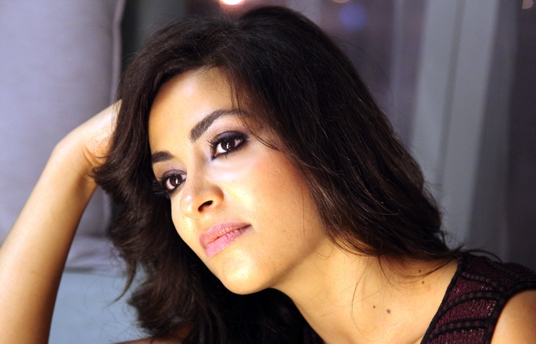فكر واشعر وتفاعل مع ياسمين المصري
30 سبتمبر 2010 — البرامج التعليمية

على مدى ثلاث أيام انضمت اثنتا عشرة امرأة عربية تتراوح أعمارهن بين 18 و 55 عاماً إلى ياسمين المصري، التي ظهرت في الفيلمين الذين حصدا استحساناً دولياً “سكر بنات” و“الرمان والمر“، بالاضافة إلى الفيلم المنتظر “ميرال” من إخراج جوليان شنابل، في دورة تدريبية حول التمثيل والرقص وكتابة النصوص السينمائية.
وقد حضرت سيدتين فلسطينيتين إلى الدوحة خصيصاً للمشاركة في ورشة العمل، كما انضمت المجموعة المشاركة إلى الممثلة في مأدبة غداء خاصة وأمضت الأيام الثلاثة التالية في خوض تدريبات حول التعبير عن الذات وتطوير المقدرات التمثيلية ومهارات الرقص وتعزيز الثقة في النفس.
وإلى جانب تقنيات الحركة المسرحية والارتجال وأساليب الرقص المختلفة من أرجاء المنطقة، تناولت ورشة العمل كتابة النصوص السينمائية والرسم وطرق أداء المشاهد المسرحية.
في المدونة في الأسفل، تشاركنا ياسمين قصتها وتخبرنا عن سير الورشة والهدف منها.
Maria Dally, an aspiring Palestinian dancer, shares her experience in the workshop
خلال طفولتي كنت مهووسة بإيجاد طرق للتعبير عن نفسي فنياً لأنني لم أكن شخصاً يحب التحدث كثيراً، عندما وصلت إلى أوروبا التحقت بمدرسة للفنون الجميلة وأمضيت السنوات العشر الأخيرة وأنا أطور من نفسي وأتعلم في دول عدة وبمختلف اللغات. في كل مرة كنت أحضر فيها إحدى ورشات العمل هذه سواءً كنت في لندن أو باريس كنت أسأل نفسي: لماذا لا يمكنني تعلم هذه الأمور بالعربية وفي الدول العربية؟
قد تبدو الفكرة سخيفة ولكن بكل صدق كان حلمي كحلم أي فتاة عربية وهو أن تتوفر لها هذه الفرص، لأنني كنت أعتبر أن الاختبار الحقيقي للانخراط بالمجتمع يعتمد على قدرة المرأة على ترجمة شغفها ومعرفتها بلغتها الخاصة.
طلاب الفنون والرقص في أوروبا لديهم تقنيات ومهارات أعلى، ولكننا في العالم العربي لدينا نضوج وشغف ومشاعر بشكل أكثر مما هو عند الطلاب في أوروبا وهي جاهزة ليتم استثمارها في المظهر العام وهذا قد يأخذكِ بعيداً لتعلم التقنيات والتعبير عن نفسِك.
ورشة العمل
هذه الورشة تحديداً تأخذكِ خلال عدة مراحل أسميها أنا “العملية” والتي ستنقسم لاحقاً إلى نظرية وعملية.
عادة ما تبدأ ورشة العمل وتنتهي بالتنفس. لقد نشأت مع إخوتي في نادي رياضي لأن أبي اشتراه منذ أن كنا صغاراً جداً، وقد تعلمنا من وقتها وفي مراحل مبكرة أن العقل السليم يحتاج إلى جسد سليم وقد أمضيت حياتي في زرع هذه الثقافة حتى أصبحت فلسفتي في التعامل مع أي شخص أو أي موقف. التنفس هو صوت العقل الصحي والدماغ السليم معاً. الخطوة الأولى هي أن تستمعي إلى نفسِك، والاستماع إلى نفسِك هو الخطوة الأولى لتبدأي أي شيء في حياتِك، وفي الوقت نفسه أنا شخص أنظر إلى الجوهر عند تعاملي مع المواقف والظروف التي تمر بي.
التحكم بالجسم
الحركات التي علمتها للفتيات تمثل بالنسبة لي الحركات الرئيسية للتحكم بالجسم والتناسق والرقص الشرقي، وهي أيضاً حركات بسيطة وأساسية ولكنها تولد من التكون الطبيعي للجسم البشري الذي يسمح للعديد من الحركات بالتطور. لطالما كانت عضلات البطن هي مركز الاهتمام في العديد من الثقافات باعتبارها محركاً للطاقة وحزاماً لحماية الظهر.
تشير الدراسات حول تقنيات التمرين التي مارستها لخمسة سنوات الآن أن الهدف الرئيسي من تقوية عضلات المعدة هو الوصل بين الأجزاء العلوية والأجزاء السفلية من الجسم، إن موازنة الجسم تأتي من كونك متصلة مع مركز جسمك، وهذا المركز يتضمن معدة قوية في تنفسها وهذا هو سبب تركيزي الكبير على هذا الجزء من الجسم.
إن الممثل أو الراقص أو المؤدي أو أي إنسان آخر هو أكثر المخلوقات الاجتماعية حاجة للتواصل من خلال العيش مع الآخرين، نحتاج أن نتكيف مع المكان الذي نعيش فيه في هذه الحياة ولهذا السبب يعتبر الاتصال بالشخص الآخر وبالمحيط من حولك هو من أهم المراحل في هذه الورشة. هناك سلسلة من التمارين المختلفة التي تضع الطلاب معاً في مواقف تخلق لهم وعياً مختلفاً بأنفسهم فيما يتعلق بالمحيط الذي يكونون فيه مع الآخرين.
التعبير عن النفس
هذه الفعالية عن اختيار الكلمات وترجمة ما تعنيه هذه الكلمات لكل طالبة من خلال الرسم، ثم نتشارك هذه الرسومات معاً ونقرأ كل واحدة على حدى مع إعطاء توضيح لكل كلمة بتسلسل سردي حر، بهدف محاولة تحويل كل كلمة إلى صورة والصورة إلى جملة والجملة إلى حركة. هذا قد يحدث أيضاً في الاتجاه المعاكس.
بالنسبة لي الفن هو تعبير مجازي مستمر لتعريف علاقتنا مع العالم وأن نصبح قادرين على التعبير عن ذلك بهدف فني.
- ياسمين المصري